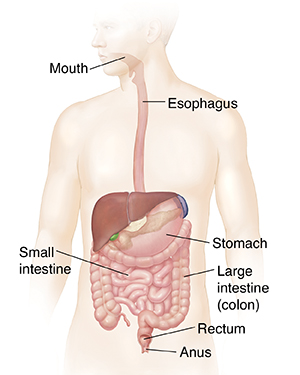What Is Ulcerative Colitis?
What is Ulcerative Colitis?

Symptoms of ulcerative colitis
Symptoms often have to do with bowel movements. Symptoms include:
Frequent, loose bowel movements
Blood and pus in stools, or rectal bleeding
Feeling that you didn’t fully empty your bowels (incomplete bowel movement)
Feeling that you need to have a bowel movement right away (urgency)
Belly (abdominal) cramps
Loss of appetite, weight loss
Feeling very tired (fatigue)
Joint pain
Rectal pain that comes and goes
Your treatment options
Your healthcare provider will take a full health history and family history. He or she will also give you a physical exam. Your provider may also order certain tests. These may include:
Lab tests. Your blood and stool will be checked.
Endoscopies of the large intestine. These tests are the most accurate way to diagnose this condition. They use a long, flexible tube with a tiny light and camera on one end. They check the inside of your large intestine.
Medicines
. Your provider will try to find the medicines that work best for you. These may include:
A type of anti-inflammatory medicine (called 5-ASA compounds or mesalamine) to help reduce intestinal swelling and inflammation
Corticosteroids to help reduce inflammation
Antibiotics to fight bacteria, if there is an infection
Medicines to control your body’s immune system (such as immunomodulators or biologics)
Lifestyle changes
Certain foods can make your symptoms worse. You may need to change what you eat. Avoid any food that makes your symptoms worse. These foods vary from person to person. But certain foods cause symptoms in many people. These include high-fiber foods (such as fresh vegetables) and high-fat foods (such as dairy products and red meat). Keep track of foods that cause you problems.
Stress can also worsen symptoms. Reducing stress may help. Methods like relaxation exercises, meditation, and deep breathing can help you control stress. Your healthcare provider may be able to tell you more about these.
If surgery is needed
Surgery may help control or even cure ulcerative colitis. It is done to remove a severely affected part of the colon. If this is an option for you, your provider can give you more information.
Updated:
March 21, 2017
Sources:
Kornbluth, A. Ulcerative Colitis Practice Guidelines in Adults: American College of Gastroenterology, Practice Parameters Committee. American Journal of Gastroenterology (2010); 106; pp. 501-523
Reviewed By:
Adler, Liora C., MD,Fraser, Marianne, MSN, RN,Image reviewed by StayWell medical illustration team.